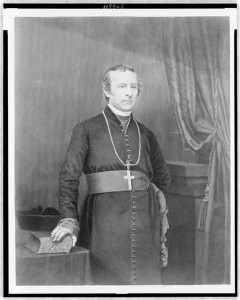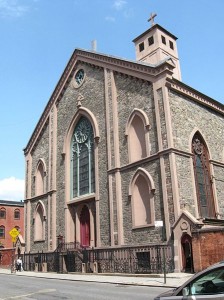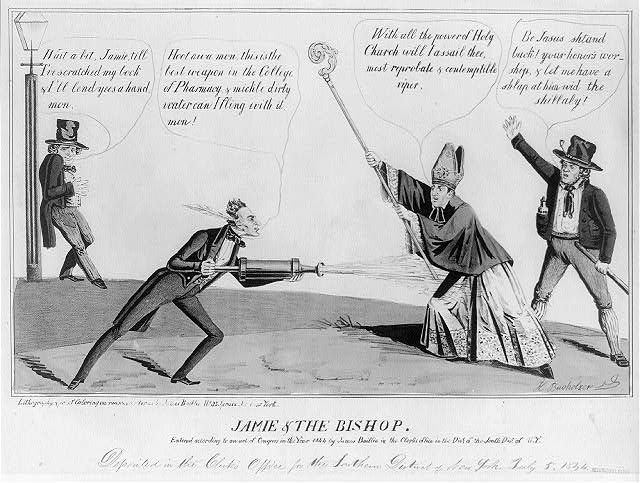From the Richmond Daily Dispatch November 22, 1862:
Archbishop Hughes Fears a foreign War.
Under date of November 1st,Archbishop Hughes has written a letter to Secretary Seward. He reiterates the stern views he has always held of the necessities of the times, and in the course of his letter speaks with a warning voice of the dangers of foreign intervention, cautioning the Government to be prepared for startling emergencies. He says:
It is just one year and eight days since it was desired, by a telegraphic communication, that I should visit the city of Washington on public business. I obeyed the summons. I spoke my mind freely. It was thought that, in the perils of the nation at that time, I could be useful in promoting the interests of the commonwealth and of humanity if I would consent to go to Europe and exercise whatever little influence I might possess in preventing France and England from intermeddling in our sad quarrel.
It has, no doubt, escaped your memory that during the fourteen or fifteen hours which I spent in Washington, I declined the acceptance of what would be to persons not of my rank a great honor. I did not absolutely refuse before deciding, but I wished to consult one or two persons very near and dear to me in New York. Finally, and at the very last hour, there was a word uttered to me, not by any special member of the Cabinet to which you belong, but by the authority which it possesses, to the effect that my acting as had been suggested was a personal request, and would be considered as a personal favor. In three minutes I decided that, without consulting anybody, I should embark as a volunteer to accomplish what might be possible on the other side of the Atlantic in favor of the country to which I belong.
What occurred on the other side, I think it would be at present improper for me to make public. I am not certain that any word, or act, or influence of mine has had the slightest effect in preventing either England or France from plunging into the unhappy divisions that have threatened the Union of these once prosperous States. On the other hand, I may say that no day — no hour, even — was spent in Europe in which I did not, according to opportunity, labor for peace between Europe and America. So far that peace has not been disturbed. But let America be prepared. There is no love for the United States on the other side of the water. Generally speaking, on the other side of the Atlantic the United States are ignored, if not despised[,] treated [i]n conversation in the same contemptuous language as we might employ towards the inhabitants of the Sandwich Islands, or Washington Territory, or Vancouver’s Island or the settlement of the Red River, or of the Hudson’s Bay Territory.
This may be considered very unpolished, almost unchristian, language proceeding from the pen of a Catholic Archbishop. But, my dear Governor, it is unquestionably true, and I am sorry that it is so. If you in Washington are not able to defend yourselves in case of need, I do not see where, or from what source, you can expect friendship or protection. Since my return I made a kind of familiar address to my people, but not for them exclusively, in St.Patrick’s Cathedral. Some have called it not a sermon, but a discourse, and even a war blast, in favor of blood spilling. Nothing of that kind could be warranted by a knowledge of my natural temperament or of my ecclesiastical training. From the slight correspondence between us, you can bear me witness that I have pleaded in every direction for the preservation of peace, so long as the slightest hope for its preservation remained. When all hope of this kind had passed away I was for a vigorous prosecution of our melancholy war so that one side or the other may find itself in the ascendancy.
The Bishop closes his letter by urging a vigorous prosecution of the war, considering the most humane battle to be that which ends the strife.
Irish-born John Joseph Hughes served as Bishop of New York from 1842 until his death in 1864. The bishop was pro-Union but anti-abolition. Mr. Lincoln and New York provides a good overview of Hughes’ 1861-62 mission to Europe. It apparently was a cordial if inconclusive visit. He had one audience with France’s Napoleon III.
You can read the August 1862 sermon which Hughes alludes to at The New York Times. He expressed his concern about foreign intervention like this:
… I do say to every man, if they do interfere, and if they interfere successfully — if the country and the Government are not maintained by every sacrifice that is necessary to maintain them, then your United States will become a Poland — then it will become divided — then the strife will multiply across every border; every State or every section will claim to be independent and make itself an easy prey for those who will turn and appropriate the divisions of the people of this country for their own advantage. …
During the 1840’s “Dagger John” defended the old St. Patrick’s Cathedral (archdiocesan seat until 1879) from a threat by anti-Catholics to burn it down by motivating at least three thousand Catholics to arm themselves and guard the church.
In this 1844 cartoon (details at Library of Congress) the bishop wasn’t taking any guff from James Gordon Bennett and the New York Herald.
In its January 16, 1864 obituary Harper’s Weekly found his speech during the 1863 New York City draft riots to be objectionable, but otherwise
..we think it would be difficult to point to a single important act in his long administration that was not wise and politic, and which, viewed from his own standpoint, was not right and honorable. He died as he had lived, a true man, and a sincere Christian.



